Divaz Media has conceptualized this idea for the Artist. In which Artist will send us a video about themselves called MY INTRO. We will broadcast this video on our youtube channel and different media channels.
Don't wanna be here? Send us removal request.
Text
What Every Actor Needs to Know About Performing Comedy

You’ve heard it said that “perishing is simple; satire is hard.” And on the off chance that you have ever really taken a stab at comedic acting, you realize that this generally will be valid. Let’s check to What Every Actor Needs to Know About Performing Comedy.
While performing dramatization might be saddling in different manners, nailing parody should be its artistic expression altogether—yet you shouldn’t let that drive you off. Here, industry and Backstage Experts share their must-know guidance for finding them amusing.
Comedic acting adheres to the all-inclusive principles of all acting.
“Above all else, truth. Honest responsibility for comedic conditions is amusing. A few on-screen characters think playing parody implies swearing off their essential acting schoolwork. Not really. Knowing and possessing your character’s destinations, stakes, impediments, perspective, theory, connections, and conditions are vital. You should likewise comprehend the story’s timeframe and area, and the orderly traditions. Genuinely entertaining parody requires making every one of these things genuine.
“At that point, there are sure repeating components in satire. Make sense of what specific gadgets are being utilized in—or might suit—the material, and you’ll realize better how to assume your job.” — Michael Kostroff, working entertainer and tryout mentor
You ought to most likely adhere to the content precisely.
“Be that as it may, imagine a scenario where you’re trying out for a parody. Practically all TV is essayist driven and in case you’re trying out for shows like ‘Blackish’ or ‘Predominant Doughnuts,’ it’s best you adhere to the content except if you’re told something else. Single-camera comedies have a little space for advertisement libbing, and just in case you’re a superior essayist than the individual who booked that staff-composing work.” — Rob Adler, entertainer, chef, educator, and Backstage Expert
You don’t need to demonstrate that you’re clever.
“Great acting ought to be imperceptible in any type. The fact of the matter I’m fortifying is that entertainers shouldn’t push the satire in any capacity or prioritize flaunting their parody cleaves or preparing. It very well may be enticing, however, I guarantee you, ought to stay away from.
“I’ve seen a ton of gifted on-screen characters commit this error at each degree of their professions. For the most part, it’s an absence of experience and preparing for the camera that drives an entertainer to guarantee they’re seen as clever. That could be because an on-screen character is new or they’ve just performed on the stage, yet I’ve likewise observed prepared entertainers who’ve done for the most part show fall into the satire trap.
“Satire has pressure focuses that don’t have an equal in the dramatization. Funniness is very close to home and for the most part, comes front-stacked with quick criticism; make a joke and you either get a snicker or you don’t. With regards to emotional principles like distress, double-crossing, and misfortune, we don’t anticipate an aggregate response.” — Gunnar Todd Rohrbacher, acting mentor, essayist, chief, maker, and Backstage Expert
Be that as it may, you do need to trust it’s entertaining.
“How can one make a comic setting? As evident as the three words I’m going to compose will sound, you’d be astounded what number of entertainers and chiefs disregard them. Think that it’s clever. The greatest mix-up entertainers and chiefs make while making parody are concocting thoughts that they think will be directly for the satire, or that they think will make the scene amusing, or that they think will make a group of people chuckle.
The main thought that is going to make a crowd of people snicker is one that the entertainer who is playing it finds so amusing, that when the individual in question is home alone and nobody is viewing and the person ponders it, the person roars with laughter. Consider it thusly: when playing a dismal emotional scene, it’s significant that the on-screen character feels extremely tragic with the goal that the crowd feels miserable watching it.
The turnaround is valid with parody. Entertainers need to feel a scene is extremely interesting for the crowd to feel it’s amusing.” — John Swanbeck, creator, speaker, feature writer, and Backstage Expert Up your vitality.
“I generally make individuals go around the room before I put them on tape for parody. We have a familiar adage for theatre: ‘Consistently hit the stage running!’ Comedy has a vitality to it. Regardless of whether you’re doing laid-back funniness, there’s a buzz to it. Also, you must have a fabulous time to do great satire, so you have to get your ‘juices’ streaming. You can’t do parody worn out or hauling.
Also, you would prefer not to have counterfeit vitality. It will cause you to feel and look constrained and unfunny. So truly hop around and get the blood siphoning in your body and your mind. Everything will happen quicker and all the more effectively.” — Cathryn Hartt, author of Hartt and Soul Acting Studio and Backstage Expert
Satire is tied in with importance, so discover it.
“Entertainers are consistently looking for a straightforward key to playing parody. The best I have run over is from that snicker machine, Sigmund Freud. In 1905, he conveyed a progression of talks in Munich that turned into the book, ‘Jokes, and Their Relation to the Unconscious.’ Freud expresses that the substance of parody ‘… is making the significant, useless,’ or, correspondingly, making the unimportant, important.
“Making the significant-good for nothing is slipping on the banana strip. Strolling gets falling. Reason becomes non-reason. On the other hand, making the unimportant important is Monty Python’s Ministry of Silly Walks.
0 notes
Text
The most effective method to enjoy a Comedy Club
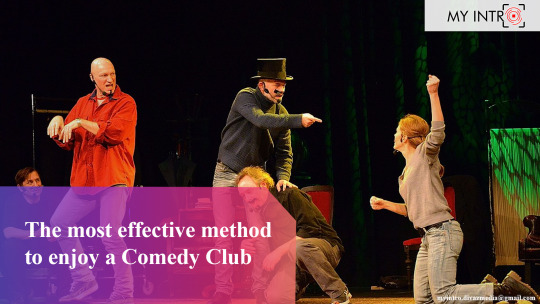
In case you’re uncertain how to live it up when visiting a satire club, this article will give a progression of recommendations to ensure that you do. These recommendations will upgrade your satire club understanding. Let’s check to The most effective method to enjoy a Comedy Club.
1. Do a little research on the entertainers you will see.
Each humorist has an off night yet as a general rule abhorrence of an entertainer has to do with content. Most featuring entertainers have a wide crowd claim however on the off chance that you are touchy to foul language or sexual substance, at that point do a fast YouTube search to assist you with maintaining a strategic distance from any restless comic you would be irritated by.
2. At the point when you buy the tickets check, check whether there is a two-thing least.
A typical objection at a satire clubs is the “two things least”. Most clubs sell nibble nourishments, beverages and pastries. Check the menu on the web or call the club. Before you welcome a companion ensure they know about the standard and are ready for the menu.
3. Be early.
Satire clubs regularly don’t permit you to pick your seats. On the off chance that you like to sit in the first line arrive early. On the off chance that you want to not sit in the first column, wait and let in any event a couple of gatherings go in first. Parody is better when individuals are sitting near one another, so when the show isn’t sold out the club will sit you together near the front. On the off chance that this occurs, don’t freeze. Entertainers never obliterate crowd individuals except if the crowd part escapes hand or inconsiderate.
4. Beset up to connect
At the point when the comic converses with you, argue. Live parody is such a lot of fun since anything can occur. Multiple times out of 10 when an entertainer converses with you, it is for no reason in particular. They are not hoping to humiliate you, simply carry you into the talk. The more input you give them, for the most part, the less time they go through with you. Furthermore, remember – it’s all only a demonstration.
5. during the show, don’t holler at the comic.
Individuals despise you shouting out remarks. Individuals have paid great cash to hear a humorist and on the off chance that you begin hollering out alcoholic remarks, you will doubtlessly be expelled from the club. On the off chance that the entertainer converses with you, argue and have a fabulous time however on the off chance that not appreciate the show unobtrusively for everyone around you.
6. Meet the comics.
After the show, stay to meet the humorists. Humorists love performing and after the show, most entertainers need to meet you. They appreciate talking after the show.
Snapping a photo with the entertainer isn’t dumb. At the point when you post it on your Facebook divider, Twitter account or whatever online life, it encourages the entertainer to manufacture their fan base. So get a sulfite and label the humorist.
Try not to inquire as to whether they know different comics you know. Another approach to get an entertainer to proceed onward from the discussion is to make them a wisecrack you feel like they can add to their demonstration. Odds are the entertainer has heard the joke around two individuals before you. Better to simply keep the discussion equivalent to a typical discussion you have with every other person.
0 notes
Text
Breaking Into Stand-Up: 10 Tips for Beginner Comedians
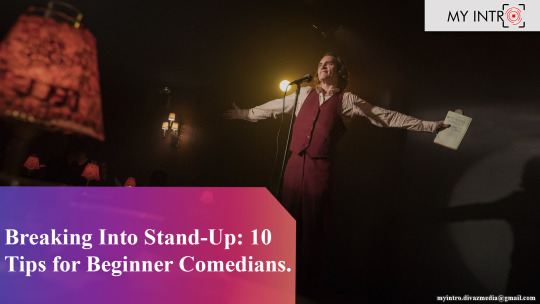
Beginning in stand-up parody can be overpowering and somewhat unnerving. Before you go nuts, look at this accommodating rundown of tips on improving your demonstration and getting over disappointment for new and battling stand-up entertainers. Let’s check to Breaking Into Stand-Up: 10 Tips for Beginner Comedians.
Get On Stage Now
No measure of accommodating tips or conversation can replace understanding, and that is practically every one of that checks with regards to holding up. It’s a genuine “learn-by-doing” artistic expression, and you won’t recognize what works (and what doesn’t) until you’ve jumped in front of an audience before a group of people. The more possibilities you need to play out, the more you’ll have the option to learn. Numerous entertainers play out different times each night in the early years, bouncing from club to club or open mic to open mic. There is not a viable alternative for organizing time in satire, so ensure you’re getting bunches of it.
Don’t Be Afraid to Bomb
You’re not going to cut the house down each time you step in front of an audience, especially first and foremost. That implies, every once in a while, you’re going to discover what it resembles to bomb. That is alright; shelling can be extremely valuable. You’ll realize which parts of your demonstration aren’t working and conceivably why. You’ll rapidly discover how you respond in these circumstances: would you say you are quick on your feet? Would you be able to recoup the set? In the case of nothing else, the experience of shelling will be disagreeable enough that you’ll work that a lot harder on your demonstration to keep away from it ever happening again. Dread can be an incredible inspiration.
Stay aware of Your Old Stuff
Regardless of whether you’re stirring up new material, remember to keep your old stuff new. Perhaps you have an extraordinary arrangement, however, there’s a punchline or label that will make a joke work far and away superior. There’s consistently opportunity to get better; return sometimes and punch up more seasoned jokes with new labels or punchlines. This can likewise be an incredible method to break out of a groove — it gets your imagination moving without expecting you to produce new material out of nowhere.
Try not to Steal
Try not to take. Simply don’t. Try not to try and “obtain” or “rethink.” It’s rarely cool, and it will end your vocation as an exceptional rapidly. On the off chance that you ever figure you may be lifting a joke from another comic—regardless of whether it’s unexpectedly or intuitively or whatever—simply drop the joke. It’s not worth being named as a cheat and a hack, which is eventually what could occur.
Adhere to Your Time
Continuously make certain to remain inside the vacancy given to you by an advertiser, club chief or open mic coordinator. It’s discourteous and amateurish to go longer than your designated time; recollect, different humorists are tailing you, and they ought to get each moment they’ve been guaranteed. On the other hand, it’s likewise amateurish to do less time in front of an audience than what you’re required to convey. That squeezes the comic after you to fill in the hole and perform longer than the person in question had foreseen. Regardless of whether you’re bombarding, you’re required to fill a specific space and should fill it. You need to set up a notoriety for yourself just like an expert, and adhering to your schedule vacancy is a decent method to do that.
Tape Yourself
In case you’re ready to (contingent upon where you’re performing), take a video of your exhibition. Consider it like a football crew’s “game film”; you’ll have the option to return and watch yourself to perceive what worked and what necessities evolving. Is it safe to say that you were talking excessively quick? Did you step on giggles from the group? These are things you most likely won’t know about at the time, when nerves and adrenalin may show signs of improvement of you. A tape will offer you the chance to inspect and consider your exhibition so you can make changes for what’s to come. Simply recall not to fixate on it excessively; on the off chance that you over-assess, you may lose so of the freshness and immediacy in your demonstration.
Hit the Clubs
Regardless of whether you’re not prepared to jump in front of an audience at a parody club yet (and you might be in an ideal situation beginning at open mic evenings), you should in any case attempt to get out and see as a lot of live satire as you can. With each humorist, you will discover some new information; study the ones you like and gain from the mix-ups of the ones you don’t (simply recall: NEVER STEAL JOKES). Furthermore, you might have the option to begin making associations with advertisers, club proprietors and – above all – different funnies. Parody is a network, and the sooner you can turn into a piece of it the happier you’ll be.
Make Nice with the Audience
Because you’ve seen different funnies (like, say, Lisa Lampanelli) affront their crowd doesn’t mean you should—at any rate, not yet. Also, it might be enticing, especially in case you’re feeling tied for material or if somebody is pestering you. You ought to react in that case, however, observe how far you take it. It very well may be anything but difficult to distance your crowd, and you generally need them on your side. Furthermore, you can’t be sure whether a group of people part is going to misinterpret a joke; numerous a comic has a tale about somebody from the crowd sitting tight for them after the show. On the off chance that they feel mortified and have been drinking (which, given the idea of the satire club, is likely), you might be expediting inconvenience yourself.
Carry a Notebook with You
You never know when or where comic inspiration is going to strike, and it would be a shame to lose the moment because you have no way of writing your thoughts down. Always be ready to take notes or jot down ideas; before you know it, you’ll have the rough beginnings of an act.
Be Yourself
A lot of comedy sites will offer tips about how you should imitate other comics, write in the style of established comedians or develop a persona for yourself. Don’t worry about any of that. No one wants to see an imitation, Dane Cook when the real one is out there, and you’re denying the audience the chance to get to know you as a comic. You want to perform stand-up because you’re funny and you love it, and those are the two most important things you need. Be true to yourself.
0 notes
Text
5 Improve Acting Tips to Create the Best Scenes Possible
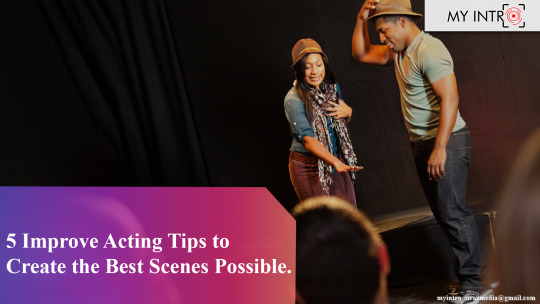
Comedy acting is accepted to be one of the best time kinds of acting, and even though it may not look hard, it is likewise one of the most troublesome types of acting! It requires continually being on your toes since no one can tell what will occur next in your scene. Let’s check to 5 Improve Acting Tips to Create the Best Scenes Possible.
A significant number of the on-screen characters that have performed on mainstream shows like Saturday Night Live have read the art for a long time, performing with comedy troupes the nation over, for example, The Second City and The Groundlings. Here are my top comedy acting tips for helping you improve your abilities.
Study Characters and Relationships
Numerous comedy entertainers have been effective because they make characters of their own, or imitate others (models: Tina Fey as Sarah Palin, and Will Ferrell as George W. Shrub). While I don’t suggest finding a big name and simply replicating their character, on the off chance that you can truly investigate their characteristics and voice and have it under control, and on the off chance that you happen to take after what they resemble, at that point you may have a decent demonstration to perform.
I urge youthful entertainers to discover amusing characters they could play, regardless of whether it’s an old grandma, a shrewd young kid, or a sweet young lady. Additionally, consider jobs in the network that may not appear to be fun, however, consider how you could make them comedic — pious devotee, bank employee, teacher, Girl Scout, sitter, fireman, cook, specialist, nurture, and so on.
It’s additionally imperative to consider the connections your character has since frequently you will be working in a gathering setting. You and your accomplices should consider how you are connected or associated with one another in the scene to prop it up. For instance, would you say you are companions, darlings, tragically deceased family members, or a customer/quiet? Consider how you can make your exceptional character and breath life into that person!
Know Your Current Events and Scenes
Since you have your characters and connections down, think about a setting where your scene happens. Possibly it’s at a café, specialist’s office, school, washroom, zoo, or burial ground. While you can’t design out how the scene will go from beginning to end in your mind, nor would you like to tell the crowd directly off the bat, it’s acceptable to put yourself in a setting, to get in the correct attitude. I believe it’s likewise entertaining to have your characters in settings they regularly wouldn’t go — for instance, a pious devotee in a gambling club, or a man in the ladies’ bathroom.
For the further developed comedy entertainer, you can include props, or just envision props (imagining you have a basic food item truck, playing get with a nonexistent ball, and so on.). I additionally propose looking over recent developments and history. Your accomplice may allude to something occurring in the news, or set a scene that is occurring during the Civil War, and you would prefer not to glance uneducated before the crowd!
Go With The Flow
Often in improv, your partner will be the one that starts the scene, and you will just have to go along with the flow. Even if you are not crazy about your partner’s character, scene, or acting choices, you don’t want to show this on stage. Go along with the scene, and add your special skills, but don’t try to change the scene, as this will throw the audience off.
One of the first rules of thumb in improv is “Yes and….” meaning you should always agree with what your partner says and add to it. Even if the scene is taking a weird turn, just relax, have fun, stay in the present, and go with the flow!
Use Your Imagination
Don’t be afraid to let loose and let your imagination run wild! Go out of your comfort zone, and work on those characters and scenes you normally wouldn’t see. Also, spend some time writing, listening to music, or watching TV/movies for creative inspiration!
Keep Teamwork in Mind
Improv is all about teamwork! It’s not a stand-up comedy; it’s all about collaborating and feeding off of each other. If you are not up for being a team player than perhaps improv is not for you In improve you have to learn how to trust and depend on your fellow actors. The more you connect, the better this will look on stage as well!
Follow these improv acting tips and you will be well on your way to being a successful actor!
0 notes
Text
BEST SCREENWRITING SOFTWARE IN 2020 (FREE AND PAID)

At the beginning of screenwriting, screenplays were composed as it has done in the good ‘ole days: on a typewriter. In those days, a Screenwriter needed to truly realize the particular screenplay design for the content to considered expertly composed. Let’s check to BEST SCREENWRITING SOFTWARE IN 2020 (FREE AND PAID).
Typewriters in the long run developed into word processors and those offered lives to the cutting edge home PC. Presently, we as a whole have the advantage and comfort of creating our screenplays on our workstations and personal computers with the guide of some progressed and easy to understand screenwriting programming programs that enable us to stress less over organization and spotlight more on the story.
Here are a few instances of screenwriting programming bundles that can help breath life into your next screenplay and even show you how to compose a screenplay
Final Draft
Still considered the industry standard, Final Draft has a long history as the go-to screenplay writing software package and it is probably still the most used screenwriting tool in film and television. Its history dates back to 1990 when it was founded by Marc Madnick and Ben Cahan and has even been awarded a Primetime Emmy Engineering Award in 2013.
In 2016, it was acquired by Cast & Crew Entertainment Services and it offers the submission-standard formatting structure for studios, the Writer’s Guild of America, and world-wide screenplay contests.
Final Draft is simple, efficient, and powerful and allows the Screenwriter to quickly and effectively navigate screenplay structure while meeting the rigid requirements of screenplay format. One of its best features is that the built-in SmartType component remembers the names of characters and locations and automatically “learns” them so that even when you type the first letter it will give you a drop-down list of options. Cutting the time you need to type each item.
COST: $249
Movie Magic Screenwriter
In an extremely close second spot to Final Draft is Movie Magic Screenwriter, which not just enables you to all the more effectively compose a screenplay. Yet additionally has worked in positions for organizing plays, teleplays, musicals, comic books, books, and short stories.
It has additionally formally embraced by the Writer’s Guild of American East. Its import alternative is marvellous, enabling you to import screenplays began or completely written in Microsoft Word, PDF, or Rich Text Documents with next to no re-arranging required.
It’s practically difficult to differentiate between Final Draft and Movie Magic Screenwriter and both has considered. “The enormous two” with regards to first decisions in screenplay programming. They has likewise the most costly and when refreshed forms has discharged.
Those redesigns generally cost the proprietor about $99 more to move up to the most recent adaptation. You need to recall that screenplays were initially composed on typewriters and screenplay authors retained the arrangement.
COST: $249
Fade In
At a progressively reasonable sticker price. Fade In is turning into an aggressive and solid option in contrast to Final Draft and an ever-increasing number of Writers are utilizing it. This is what you have to note about submitting screenplays to rivalries, studios. The WGA, or class assignments: they will either messaged in the widespread PDF group or delivered on paper and the product used to make the screenplay will insignificant by then. So don’t worry about utilizing what’s viewed as the business-standard. Simply discover programming you can bear the cost of and that takes care of business.
COST: $79
Celtx
While Final Draft, Movie Magic Screenwriter, and Fade In offer one-time buying choices, Celtx has a month to month membership. Internet screenwriting programming bundle that offers screenplay composing fundamentals including a thorough content manager, standard screenplay groups, standard stage play positions, 2-section Audio/Video designs utilized in TV and ads, storyboarding alternatives, shaded amendment following. And email and online help.
COST: $20 monthly
($180 if you pay for the yearly subscription)
Writer Duet
Essayist Duet has offered totally on the web, yet also, offers disconnected composing choices. The best thing about it is that you can compose your initial 3 contents free online with their cloud-based composing programming. There is no page limit, no time limit, and no restriction on sending out or bringing in your work. It is an extraordinary choice that offers a considerable lot of the screenwriting decisions offered by Final Draft, Movie Magic Screenwriter, or Fade In.
COST: $11.99/month
Slugline
Structured solely for Mac, Slugline is moderate and clean. The designers of Slugline guarantee that it is the best-checked on screenwriting programming in the Mac App Store and its crucial to remove organizing totally from the Writer’s way. Enabling the Writer to concentrate on the story.
It works very well on the iPhone and iPad and its Outline Navigator refreshes your content live as you compose. It offers a cool night mode for composing around evening time beside your accomplice while the person in question attempts to rest when you simply need to make a cutoff time. Offers touchscreen altering on your telephone or tablet. It’s cutting edge, quick, and moderate.
COST: $39.99 for desktop
($19.99 for iPhone and iPad)
Montage
Now we’re starting to get into the lesser-known screenplay packages. That may not be as fluid or well-designed as some of the industry standards. However, don’t write off a software package like Montage just because of its lower cost. Its best asset is that it allows long-time Final Draft users to easily import Final Draft formatted scripts with little to no re-formatting.
That is a huge benefit for Writers looking to keep writing in an industry-standard while saving a few bucks. No one wants to re-write a script and Montage allows you to pick up where you left off while no longer having to use Final Draft. The copy of FD you have maybe on disk and perhaps you can’t afford the cost of new FD downloads. That’s where Montage can step in.
COST: $29.95
HIGHLAND 2.
Highland 2 is one of the best screenwriting software in the market currently. However, as of now, it is compatible only with Mac. It has a user-friendly interface that is easy to navigate so that you can focus solely on your writing. Moreover, it offers high customizability and is excellent for individuals or teams that have diverse requirements. Furthermore, it has a free version with minimal features. To access better, more advanced features, you need to upgrade to a paid version
COST: $59.95
0 notes
Text
4 Steps to Become a Famous YouTube Comedian

Everybody cherishes a decent interesting video. Be that as it may since there are such a significant number of clever recordings on YouTube. Standing apart as a well known YouTube entertainer is quite serious. Let’s check to 4 Steps to Become a Famous YouTube Comedian.
Picking up ubiquity and accomplishment in YouTube parody is truly conceivable, however, and here are five stages to get it going
1. Find your comedic style and stick to it.
To begin with, make sense of what your comedic style is. There are such a significant number of types of cleverness on YouTube, including spoof, parody, vacant, relatable, and that’s only the tip of the iceberg. What sort of amusingness makes you chuckle? What kind of amusingness do you use with your companions? When you nail it down, ensure that you stay with it. Try not to attempt to constrain another comedic style in your recordings, since quality funniness easily falls into place.
2. Learn from YouTube comedians in your humour genre.
When you’ve nailed down your comedic type, watch recordings from YouTube entertainers and characters with a comparable comical inclination. You can become familiar with a lot about how to structure and style your recordings from watching experts, and you can even get tips that help the satire stream! For instance, Shane Dawson utilizes cutaway scenes, Jenna Marbles utilizes various voices, and practically all YouTube entertainers have catchphrases!
3. Practice talking on camera and make a “test” video.
Parody on YouTube is altogether not the same as satire, in actuality, or in different stages. Basically chatting on camera can be a test, also additionally attempting to be interesting and brief. In the first place, basically work on chatting on camera about anything, and attempt to weave in some funniness (as interesting side considerations, amusing perceptions, and so forth.). The more you do this, the more agreeable on camera you’ll turn into.
In case you’re feeling bold, you can even post these freestyle recordings on YouTube and measure the watchers’ reaction as their preferences and remarks! (What’s more, don’t be disheartened if the reaction is at first negative… attempt to gain from it!)
4. Keep your bloopers.
Bloopers are great for so many reasons, the first being that they’re funny lines that you don’t have to write! Viewers like to see that YouTube comedians are down-to-Earth, authentic, and not afraid of looking ridiculous! Featuring your bloopers will definitely make new viewers warm up to you quickly. Also, you may even find hidden comedic gems in your bloopers (because so many jokes and funny moments happen on accident), and you can incorporate them into the main part of your video!
Lastly, remember that there are certain guidelines for boosting the popularity of nearly any YouTube channel, and comedic channels are certainly no exception. Don’t forget to post videos regularly, keep your videos relatively short (10 minutes max, and preferably much shorter), ask viewers to like/comment/subscribe, and engage with your audience and other YouTubers!
So have no fear, aspiring YouTube comedians! If you find your comedic style, learn from YouTube comedians, practice talking on camera, keep your bloopers, and remember the basics, you’ll become a YouTube comedian in no time!
0 notes
Text
Step-By-Step Guide to Making a Music Video
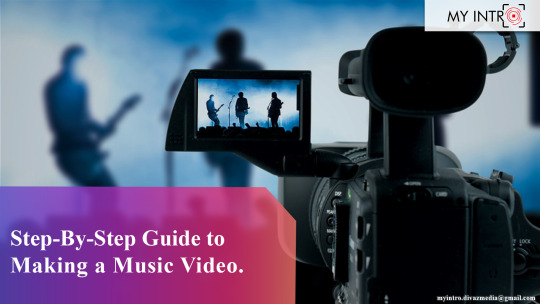
A music video can help you promote your brand through social media channels such as YouTube, Facebook, and more. Contrary to what you may think, a music video doesn’t need to cost a fortune. What’s most important is that you have a good idea, a good team, and a well-defined budget. Let’s check to Step-By-Step Guide to Making a Music Video.
Some production companies charge a fortune for even the simplest promotional videos, but you can do it yourself. Or, if you are willing to give an up-and-coming filmmaker or producer a chance, they will often do it at a low cost (maybe even free of charge).
Before you begin producing your music video, it is important to plan and consider a few key things. Here’s a step-by-step guide for how to make a music video.
Choosing the Right Song
While it might seem like the best idea to simply make a video for your next upcoming single, that may or may not make the most sense. Here are a few other factors to consider when choosing a song:
ü Think ahead or recycle an old song.
It will take a lot longer than you think to shoot, edit, and produce a music video. If the song is three minutes or longer, your “new” single might already have come out by the time you’ve published your video. Instead, consider selecting a song that has done well in the past or use a single that is planned for release in the future, after you plan to publish your next single.
ü, Don’t merely think in terms of a “single.”
Honestly, in these days of Internet streaming, any track can be a single. Therefore, you might pick a track from an album that you had a great music video idea for in the past, even if that track wasn’t originally planned as a single.
ü You might want to start small.
For every minute of a song in a music video, it can take you and your crew anywhere from 2-10 hours of shooting, editing, and finishing. The longer you take, the greater your risk abandoning the project.
Casting the Film Crew and Getting Equipment
However complicated (or simple) your shoot is, you’ll need a team. If you have a team, everyone should be clear on what they are responsible to accomplish. Here are some of the roles that you will need to fill:
Cameraperson: 1 or more individuals
Lighting person for any indoor shots: 1 individual
Actor(s): the number of individuals varies based on what kind of video you seek to create
Director: 1 individual that everyone acknowledges as “in charge”
Band members: this should be obvious, but make sure that all your members are on board and able to commit to their scheduled shooting days
As you build your team, consider their individual needs. If you’re shooting through mealtimes, either provide food or at least remind crew members to bring food and set aside time for people to eat. If you are shooting all day, or for several hours, encourage the crew to take breaks
Planning the Shoot
Wasted time can cost you more money (if you’re renting by the hour/day) or sour relationships (where you called in favours). Most film crews who do more “hanging out” rather than working, are simply responding to the lack of planning. So take a few minutes (or hours) to think through how this music video will be filmed.
It is customary to build storyboards for each shot. This will ensure that you don’t miss anything and that you can describe to your crew what you need. Feel free to Google “music video storyboard template” to find and download a template to work from. Sketch out each scene in the box and describe the scene underneath
Using Stock Footage
You can spice up your video by adding stock footage, but you’ll need to be aware that almost all video footage is subject to strict copyright law. Making use of footage without the copyright holders’ express permission is illegal.
However, there are also sources of footage that you can use legally. Royalty-free footage is footage you can reuse in any setting, without asking permission or paying the copyright holder a fee each time you use it; but you may have to pay a fee to obtain it in the first place. Lastly, there are several free stocks, royalty-free sites to check out before paying for stock footage.
0 notes
Text
Tips for Building Better Cinematic Suspense

If you are like me, then you appreciate a film that is so suspenseful it quite literally brings you to the edge of your seat. Let’s check to Tips for Building Better Cinematic Suspense.
It’s in those moments, when a film is not a series of shots but rather a cohesive, frightful and nerve-racking story, that it has accomplished its goal of creating suspense. What are the common filmmaking techniques for creating suspense? I’ve listed out my favourites below. Use these tips and examples to help improve your film’s suspenseful edge.
Tip 1: Give You Character Breathing Room
Many films today utilize a fast cutting routine of quick edits and spastic pacing that encourages quick cheap suspense. For deeply suspenseful editing, try giving your characters a few extra seconds of screen time. Create slow, methodical pacing in your scene, showcasing close-ups.
If you are in the process of revealing an important plot element, or simply establishing the anxious nature of the character surrounding their situation, allow the shot to linger before cutting away. The longer you hold on your character, the more anxious the audience will become when the stakes get high.
Tip 2: Time Your Reveal
Suspense in the film is based around the anticipation of an upcoming event, and how the story unfolds in the attempt to get there. As you decide where to place your reveal, allow your cuts to build without becoming too hasty. As we can see in this example from The Dark Knight, music plays an important role in building the tension until the reveal.
Tip 3: Mix Up Your Lens Choices
The visual field in your film is key to creating cinematic suspense. How much depth you place in your image is important, especially when your suspense is built around an environment. Try utilizing different lens types in your scene to help build the tension.
As you transition from a wide-angle 24mm to a 50mm, the difference will cause your audience to pay closer attention while giving them important surrounding detail. Or if you want to throw them off, try going from a super-wide 16mm to a shallow 85mm. The difference could help your audience stay connected longer.
Tip 4: Pull Back Reveal
Slowly pulling back the camera to reveal the ‘bigger picture’ is a shot that has been used time and time again. This technique is great to utilize when you want to tease your audience by prolonging the reveal until the perfect moment
Tip 5: The Long Tracking Shot
A staple for filmmakers, the tracking shot is great for any form of storytelling. As your scene progresses, the lack of cutting could create a more realistic feeling for your audience and the constant motion of the long take will engage your audience in a way that quick cuts may not.
0 notes
Text
10 Best Royalty Free Music Sites For YouTube Videos

There’s a difference between free music for YouTube videos and royalty-free music. Free music is where you can just download the music for free. But it’s not necessarily free to use. Let’s check to 10 Best Royalty Free Music Sites For YouTube Videos.
You might face copyright issues. Whereas copyright free music means it’s just free of any royalty fees. You have to just once, to buy it. Or get it free from other resources.Once you buy/get the track. You can use it for free in a video. Without being charged for the music per number of views.
1. HookSounds
HookSounds has an exclusive, well-curated music site that offers a variety of original tracks, composed by hand-picked artists from all over the world. Most online content creators are looking for modern, trendy, unique music and that’s exactly what HookSounds provides to its audience
2. EnovoMusic
EnovoMusic offers un-compromised music production at affordable prices for Unlimited Online videos & TV/Radio broadcast advertising
3. Artist
Aiming to give YouTubers ultimate creative freedom, Artlist has founded in 2015 and pioneered the music licensing industry’s shift to the subscription-based model.
Artlist removed all limitations from music licenses, allowing unlimited downloads and unlimited use for a fixed yearly price of $199. Plus, every song you download with an active subscription is yours to use forever.
4. Foximusic
Foximusic let you buy tracks to use on an unlimited basis, and in any way you like. This is a really simple option for those looking to monetize their content on YouTube, Facebook or any other social media. Foximusic offer the best royalty free background music license terms I could find on the market.
5. YouTube Audio Library
A most popular source for getting audio files from YouTube’s free music library Music, sound effects that can be added straight away to your videos on YouTube, or download them to work offline.
6. Epidemic Sound
Epidemic Sound was established in 2009 with the sole reason for making potential outcomes and advantages around music in all stages – both for the ones who form it and the ones who use it. This is one of the best places to get copyright free music.
7. Free Stock Music
True to its name Big stock of free music Hundreds of free tracks in a range of genres. Formats available in MP3, WAV, & AIFF Free sign-up No attribution required.
8. Incomptech
One of the top sites for copyright-free music Easy search and filter Hundreds of music tracks available as MP3 files Decent sized library Regularly updates new music Attribution required in a specific form
9. TeknoAxe
Citation required which complies with C.C. 3.0 license: A link to the TeknoAxe YouTube Channel, a link to the TeknoAxe website, a link to YouTube video where the music was used, or a link to the specific webpage on the site with track location.
10. Machinima Sound
A wide range of tracks, genres Look for those marked as Legacy Available in MP3 format Attribution required under a specific licensed format
0 notes
Text
The Difference between Sound Editing and Sound Mixing Explained

The Oscars are back. Every year, it has a night of celebration, celebrity-filled red carpets, well-tailored suits, glamorous dresses, and … Confusion. Let’s check to The Difference between Sound Editing and Sound Mixing Explained.
No, we’re not talking envelopes. We’re talking sound. Specifically: what the hell is the difference between Sound Mixing and Sound Editing?
Yes, if you didn’t know, there are several sound categories at the Academy Awards. Sound Editing and Sound Mixing are potentially the most confusing and there’s a big difference between the two. And unless you’re an audiophile or someone who can name the audio technicians on every theatrical release of the year (if this is you, I’m so sorry) then you’re probably clueless as to what that difference is
But look no further. We’ve got you covered, all with the help of our good old friend, Baby Driver.
Sound Editing
Sound Editing essentially covers all the sounds that has recorded and will added into the film, like the sounds of a creaky door, or the squeaks of basketball shoes changing direction on a gym floor. It’s a bit more complicated than just holding a microphone up to a car engine revving, though. A lot of sounds has recorded on set. But some has done after the fact (think of all those fictitious sounds in Marvel movies). All of those sounds has created to build the natural, holistic sound of the scene.
For the sake of clarity, let’s revisit that opening scene of Baby Driver. Which has conveniently nominated for an Oscar in both Sound Editing and Sound Mixing at this year’s Academy Awards.
Notice during the bank scene at 1:46, how the muffled dialogue and gunshots are audible through the glass windows. How you can hear the bank alarm, the engine revving, the gears shifting, the footsteps, the release of the emergency brake, the gripping of the steering wheel, the sound of the car doors opening, and the screeching of the tires all in concert. These sounds has either recorded during filming or separately and has used to highlight the natural, ambient noise of the environment.
Another good example is Blade Runner in 2049. Sound editor Mark Mangini, who’s nominated for his work on the film this year, says he recorded, created and designed more than 3,000 unique sounds to bring the fictional world to life. The sound editor creates the sounds for everything the audience hears, and the best way to understand the art of sound editing is to watch the film on mute, he said.
Sound Mixing
Now let’s revisit this scene. But this time, pay attention to the very beginning. As Ansell Elgort flips through songs on his iPod
The first full minute of this clip is a great example of sound mixing. How the music queues up with the clicking of the iPod, how it sounds like a background track, but then has later revealed that it’s the song that the character is listening to in his headphones. Notice how he perfectly mouths the lyrics, dances to the beat.
All of this is done after the movie is filmed. Where the sound is mixed in with the ambient noise of the scene and the dialogue. It’s more than just adding music to video. As in this scene, it’s all about using music (making sure that each noise is at the right level) as an element of the movie.
The Green, a sound editor also nominated for his work on Blade Runner 2049, said one helpful distinction to know is that sound mixer used to be called “balance engineers.”
“So that maybe explains both what the production sound mixer is doing — balancing levels between clip-on mics and overhead boom mics for instance — and also that the re-recording mixers are helping to balance the levels of music, dialogue and effects,” Green said. “That word ‘balance’ explains what mixers do better than ‘mixing’ I think. Finding that balance is a fine art
0 notes
Text
5 TIPS ON HOW TO BECOME AN ACTOR WITH NO EXPERIENCE
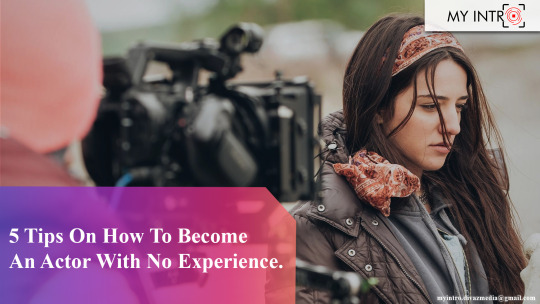
Want to become an actor or actress? You should be ready to commit the first few years of your career mastering your craft and learning many skills to help in landing the perfect part. Let’s check to 5 TIPS ON HOW TO BECOME AN ACTOR WITH NO EXPERIENCE.
Whether you are looking for a fun hobby or a full-blown career, these ten tips on how to become an actor with no experience can help you get started on your path to fame. More details 5 tips on how to become an actor with no experience
1. DO NOT MOVE TO A MAJOR MARKET RIGHT AWAY.
Being an actor in Los Angeles or New York is remarkably difficult for performers with decades of training and experience. But if you are an actor with no experience don’t even think about trying.
While there may be one or two people in the history of film and television that got off a bus and were instantly discovered, most of them have to struggle just to try to get unpaid work. If you are green, stay where you are Get a few years of serious training under your belt, and begin to build up a resumé that you are proud of before you even think about leaping.
2. STUDY.
If you want to become an actor with no experience, the first thing you should do is get some experience. Find an acting class, or look into professional classes if you’re serious. While it is possible to get a little work as a novice, you also have nothing to gain by remaining inexperienced.
Take some classes and refine your skill. It will take a lot of time and patience, and if you are anxious to get started than by all means, audition for some local projects. But most people probably won’t take you seriously until you have some acting lessons under your belt.
3. AUDITION FOR ANYTHING.
Most local theatres are always looking for actors just like you. So if you are hungry to learn, and most importantly, willing to work unpaid give them a try. If a local car dealership needs a commercial, volunteer to be in it. Go to the local colleges.
Even if you live in a very small town, the school probably has some type of film program. Not only will doing these free projects build your resume, but it will also get you into the habit of auditioning and performing. There is no better way to learn how to act than to act
4. LEARN SOME SPECIAL SKILLS.
Seriously. If you are an actor with no experience, auditioning against a seasoned professional, some special skills may give you the edge over your competitor and help land you the part.
If you know how to ride a horse or a mountain bike; play golf or tennis and the part requires such understanding, that special skill alone can get you a callback. Diversifying your talents in this way will be doubly important when you move to a major market, so why not start honing these abilities now and you may also enjoy the experience.
5. WHEN ALL ELSE FAILS, JUST PLAY.
If you don’t have any experience, the best advice for any novice jumping into the business is this: never forget how to play. Sometimes it’s not all about training and experience. Children are so mesmerizing to watch because they have not forgotten what it is like to play, and explore. Children are not afraid to look stupid, and neither should you.
0 notes
Text
The Role of a Casting Director and Skills Required

As with most entertainment jobs, if you want to be a casting director, you’ll need to start low, aim high, network and have some luck along the way. Let’s check to The Role of a Casting Director and Skills Required.
And while no specific training is required to be a casting director. You’ll be more likely to succeed with some education, experience and the right personal skills.
Education
To understand the industry, you’ll probably want to study at a two- or four-year college that offers classes in film and theatre arts, such as acting and directing, as well as business management. Casting directors need to know how to negotiate contracts and understand the complexities of working with union employees
Experience
Becoming a casting director usually means starting at the bottom of the industry. Look for an internship with a casting agency or a casting director who would take on another assistant or low-level helper.
From there, you can work your way up to associate casting director. Remember that producers, directors and studios won’t be willing to hire you unless you can show you have the experience to do the job well.
For an updated list of casting directors and agencies, go to Breakdown Services. The Casting Society of America, a professional association for casting directors, offers a member directory and a glossary of casting and film production terms.
Networking
More than other entertainment jobs, this one is about who you know. Making connections will help you move up in your career. And it’ll give you the contacts you need to make good casting decisions. You’ll need to be able to quickly and easily find the right actors for the roles. Which means knowing the actors and keeping good relationships with talent agents.
Personality
Is being a casting director a woman’s job? Casting director Juliet Taylor makes the argument in the book “Women in American Theatre” that women may be especially suited for it.
But as a casting director, you’ll also need:
Excellent communication skills to work with both sides — studios and directors, and actors and talent agents
negotiation skills
organizational skills to juggle projects and keep them all on track
good memory for script details, actor abilities and contact names
careful attention to detail
patience and persistence
For lots more information about casting directors and related topics, check out the links below
0 notes
Text
How to Be a Better Stage Actor Have you?

Have you ever wanted to begin acting, or do you just need some pointers on acting? Either way, taking these simple steps will improve you as an actor, as well as improve your chances at landing a great role! Let’s check to How to Be a Better Stage Actor Have you?
Relax: Great actors spend their entire careers learning to relax the muscles in their face and body at will. Tension is very obvious when you are on stage. Your voice will sound thin and wavering, and your movements will be jerky and unattractive.
To avoid these stiff and nervous displays when you’re acting, it is essential to remain as relaxed as possible. Even a scene involving high drama calls for measured and calm concentration from the actor. So, act dramatic, but be calm inside, and don’t work yourself up. Focus your attention on something on stage. It could be another actor, a prop, etc.
Keep yourself at the moment and never stare off into space. It is obvious to the audience if you are vaguely out and it is very distracting. Keeping in the moment enables you to remain in character and enhances the believability of the role and the play itself. Also, try not to play with your clothes, or use other nervous gestures, just look at the back of the theatre, or your focus point, if you are tense.
Immerse yourself in the role completely: Forget that you are pretending and try to become the character you are playing. Envision how that person reacts to life, how that person dresses, walks, thinks and converses with others.
Don’t be afraid to act like someone else, Draw on these visualizations when portraying the character. Always stay in that state of mind when acting. If you try to pretend to be sad, it’s an effort; if you are sad, it comes out in your acting well. Do not try to act the character – instead, be the character. Remember that everything is exaggerated on.
Stage: If you’re up on a stage, you need to enunciate your words all the emotions on your face need to be formed more intensely but remember to stay relaxed. If you feel like you’re over-acting, then you’re probably acting just enough. Eyes, smile, facial expressions, gestures, etc., need to be more expansive and dramatic than you would ever make them in real life. Be careful if acting in front of a camera, however. Here you must be more subtle, as in real life, because a camera picks up subtleties very easily and broad and exaggerated.
We all need to continue to learn and grow as actors if we want to have a successful acting career. So let’s dive in!
1) Stop acting Acting is all about being able to live truthfully under imaginary circumstances; so how do you stop acting and start living? This is how to be a better actor
2) The Story is the Most Important The first step towards learning how to stop acting is to realize the importance of the story. As actors, we often take the story of a play, film, or television show for granted. We read the scripts and see the vivid characters in our mind’s eye and then we start to think about how we can “make it more interesting” or “do something different”.
3) Be a Real Person The second idea that clicked with me on my quest to discover how to stop acting was the idea of my character being a real person. Crazy right Again it seems like a super simple concept but we all forget it.
4) Be Specific and Commit. Being specific will stop you acting Directors will always ask for higher stakes in general terms: to love more passionately; to seek revenge more intensely; to hate more fiercely. Your job as an actor is to make these requests as specific as possible and commit to them. As people we don’t generally love someone, generally seek revenge against someone, or generally hate someone.
0 notes
Text
Pretending To Be Famous In the Sims
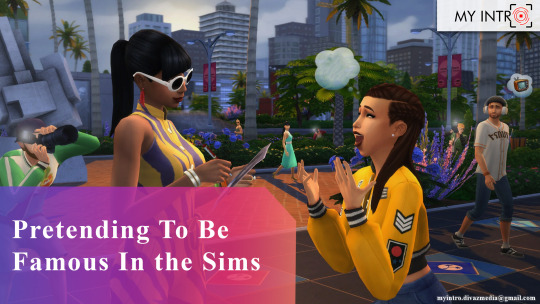
Often, the appeal in playing The Sims has watching humanoids navigate barely exaggerated scenarios inspired by your own life: finding a job, finding love, and, with luck, living to see old age. Let’s check to Pretending To Be Famous In the Sims.
Major game-play additions—“expansion packs”—can propel the game ever closer to real life, in all of its monotony. Get to Work, released in 2015, extends gameplay from the home to the office and allows Sims to open their businesses. City living, from 2016, allows you to hunt for an apartment in the big city. 2017’s Cats & Dogs and 2018’s Seasons let Sims experience animal companionship and weather, respectively. Sims 4: Get Famous, released in November, introduces social media and influencers to play with another aspect of modern human existence: the managerial upkeep of identity. All details information pretending to be famous in the sims
When you install Get Famous, all of the Sims in your game has endowed with their public image, which has a two-part composite of their reputation and celebrity level, both measured in stars. Fame is a choice here, and Sims may “quit the spotlight” if they so choose. My Sim, Caterina Doherty (no relation to the baroness), began her life as a young adult, a zero-star Unknown with a neutral reputation. She chose to remain in the public eye, of course—I specifically created her so that she could become wildly famous.
This latest expansion pack is not the first time that the franchise has played with the idea of fame. I remember chasing celebrity in 2003’s The Sims: Superstar. Which allows you to turn Anybody’s into A-listers and incorporates the likenesses of real-life stars, such as Andy Warhol and a “Dirrty”-era Christina Aguilera, and also 2012’s The Sims 3: Showtime. Both games channeled fame through the usual showbiz disciplines: singing, acting, or otherwise performing on stage or camera. Although celebrities in Showtime can greet other Sims with an “Ever heard of me?” and, in the more cynical Superstar, suffer nervous breakdowns that get reported in the tabloids, the games made chasing fame seem like an honest living.
In the years since Showtime, though, the nature of celebrity has changed: movie stars are on television, television is online, and online is everywhere that meets the eye. But the game incorporates those changes without judgement. “Our goal isn’t really to parody them,” said Grant Rodiek, a senior producer at Maxis, the studio behind The Sims, speaking to The Verge about the new in-game Sim influencers. “Really what we do in the game is generally lighthearted . . . We present this as a serious career, a real career, a real way to go about making a living.”
It should be noted that getting rich, available as a rewarded objective since Sims 2, is much easier than becoming famous; any Sim that goes to work and spends thriftily can be affluent before old age.
The usual Sims pathways remain in getting Famous—actor, musician, author, stylist—but now characters can also accrue fame in their free time or even without formal employment. In the spirit of things, I made Caterina a full-time social media influencer. A bright-green “+Fame” qualifier allows users to nudge their Sims’ celebrity level by directing their Sims to post social-media status updates or upload photos to Instagram.
There’s no Simified SoundCloud or YouTube, but Sims can produce music tracks, upload vlogs and product reviews, and collect daily royalties according to viewership. I found myself drawn to those glowing bonuses like a dumb moth, choosing the weighted options every time they appeared. Between writing a column (which doesn’t affect fame scores) and writing a blog post (which boosts fame scores), I chose the latter; I shilled every snapshot doubly to Simstogram and the press; every amateur painting went for whatever an art dealer was willing to pay.
Get Famous makes two types of in-game drones available for purchase with Sims money. And Sims can upload pre-recorded drone footage or stream life, quickly gaining bursts of new followers. Were the device not limited by what felt like brief battery life. I would have bid my Sims to live-stream everything for the sake of exposure. You cannot, I’ve discovered, take drone footage of Sims mid-“woohoo,” the game’s euphemism for sex.
Still, I has unpleasantly surprised at just how much of a grind the game’s “path to stardom” has. Getting famous takes forever. And it is more fun to be famous than it is to get famous. As Caterina spent her time interviewing strangers. Improving her writing skills, and blogging for attention—advancing from Rag Reviewer to Culture Columnist—something told me that I’d there before.
In one work dilemma called Freelance Op-Ed, a Sim must submit either a “hard-hitting exposé” or a “fluff piece” to, as we’re told, “THE premier culture review zine.” With journalistic gumption, I directed Caterina to chose the exposé. only to receive a decline in “hygiene” and “work performance,” though the game notified me that the decision “leaves her feeling empowered.” I had there before.
0 notes
Text
8 TIPS ON HOW TO BECOME A CHILD ACTOR

Once you’ve decided that you want to pursue a career in acting, you’ll need a good plan of action on how to become an actor with no experience. Like we talked before in how to start an acting career column, planning is key. Your main goal will be to expand your acting resume with skills, experience and training. Let’s check to 8 TIPS ON HOW TO BECOME A CHILD ACTOR
There are many things inexperienced budding thespians can focus on to advance their careers, and they’re all interrelated. Some of those involve looking for jobs. And others are simply complementary to your acting career that will eventually result in you finding and booking more auditions.
So let’s get down to it. Here are the 8 tips on how to become a child actor with no experience and how to do to it in the most efficient way possible.
1) Study! Study! Study! Enrol your child in Acting Classes, Improv and Scene Study. Don’t put your kid “out there” on auditions and interviews until he or she is truly ready to go out. *HMB has an ever-growing list of wonderful acting schools, coaches and camps.
2) Get Experience! Do student films, local theatre and school play.
3) Get Head Shots! And we mean good headshots, taken by a professional photographer who specializes in babies, kids and teens. Make sure you leave with both Commercial and Theatrical looks. This is your child’s calling card and first impression with casting 0directors. Check out some of HMB’s favourite photographers here.
4) Get an Agent Submit to the top talent agencies for kids in your market after having researched them thoroughly. Meet with them in person before committing.
5) Join online casting sites like Actors Access, Casting Frontier, Casting Networks (aka L.A. Casting), Catz, etc.
6) Network through and read up at industry sites: We recommend Hollywood Mom Blog, Looking Ahead Program, SAG/AFTRA Young Performers, and BizParentz.org
7) Keep your credit card in your pocket! Don’t pay anyone for “advice” or “services.” Other than acting classes, agent-requested headshots and getting set up on the legitimate casting websites. You don’t need to fork over ANY money. Stay away from conventions, weekend seminars and packaged deals that promise to “make your kid a star!”
8) Remember Show-Biz is a business. Once you’ve decided as a family to take this journey, keep your commitments (like classes and auditions), even if you’re having a bad day
0 notes
Text
Haunted house acting tips

You may know them as the deranged clown, the mad scientist, or that guy with the chainsaw who won’t stop chasing gaggles of shrieking girls down a dimly lit hallway. But behind the fake blood spatters and caked-on makeup. They’re just regular people trying to have some fun while making money. To find out what it takes to be professionally terrifying. We spoke with three people who served as “scare-actors” and lived to tell the tale. Here are some tips for people with little or no acting experience who find themselves with responsibility for playing parts in them. Haunted house acting tips
1) Know your part
Many small haunts do not have professional actors. Here are some tips for people with little or no acting experience who find themselves with responsibility for playing parts in them.
2) Stay in character
Your haunt may or may not have a script, and your director may or may not need you to stick closely to it. There is usually room for ad-lib, in fact, it almost always necessary to deviate a little from the written lines as you react to guests who may talk back to you or move slower or faster than you expect through your room. Spend some time thinking about your character, and contemplating how you need to act to be convincing in that role
3) Timing is everything
You have an important job to do. Your job is to scare people. Your job is to make grown men cry and teach little kids that haunted houses are not for bedwetters. Nothing ruins a good scare faster than having an actor “drop character” and suddenly be a smiling, good-natured, oh-sorry-I-startled-you guy in a rubber mask. Remember, these people came here to be scared, and if you don’t scare them you aren’t doing your job and they aren’t getting what they paid for.
4) Stay in your room
If you need to pop out of a corner and yell to give people a scare. It’s not going to work if they’re still coming in the door at the other end of the room or if they’ve already moved on to the next. Understand what you need to do and be sure to do it at the right time to get the biggest scare.
5) Don’t touch the guests
You don’t know the people who are coming through your haunt and they don’t know you. Even if they do. They will high on adrenaline and (if you are doing your job) more than a little freaked out. An unexpected grab or touch can result in a fight-or-flight reaction that can endanger yours and the guest’s safety. Also, if you grab or touch someone the wrong way. There can be legal implications of assault. Your attraction should have signs posted advising the quests not to touch the actors, and the actors should all understand not to touch the guests.
0 notes
Text
Things to look while casting a play

In my experience, casting a theatre production is one of the easier bits of the pre-rehearsal process. You put the details on Spotlight, sift through thousands of applications, arrange a couple of audition days and at the end you pick the best team. I’m simplifying, but there are (unfortunately for performers) more people wanting the job than you have jobs to give. Let’s check to Things to look while casting a play.
Casting a community production is very different. Dark Earth has a large cast piece that I’m currently directing and it’s a thrill to have 37 parts to play with. Having spent much of my career working with casts of four or five. Crowd scenes can be genuine crowds. The possibilities for puppetry and music are greater. And I am freed of intricate Excel spreadsheets indicating who plays which part when.
This is a common problem on the amateur dramatics scene – never enough men! I’m not a prolific tweeter but faced with a lack of eligible gentlemen. I took to Twitter with all the enthusiasm you would throw at a new love affair! Hourly tweets with pleas for retweets from anyone and everyone. Then someone pointed out that given I was searching for men over 50, Twitter might not be reaching my target group.
I turned to the radio. BBC Radio Cambridge shire kindly agreed to interview me on their breakfast show, and while I attempted to squeeze in all the relevant details, the host was more interested in entertaining his listeners with the spy jokes than casting the production. Fair play, but I was still four men short.
Panic. We delayed the first read-through by a week in the hope of having at least the main characters in place. I remember Ivan Cutting, artistic director of Eastern Angles, telling me that it would be fine, that the cast would be our best ambassadors and people would come through. Frankly, I didn’t believe it.
The Sunday before the read-through I printed out a cast list. Two gaping blanks stared out at me accusingly. How could we be in this position when the project had been in the planning for so long? Should we have started recruiting earlier? It was a long night of fretful, interrupted sleep.
But what a difference a day makes. I checked my email the next morning. Keely have two men coming that evening, and two cast members have also bringing possible candidates. As our rehearsal venue filled up, my fear and trepidation began to melt away. I looked around at the 45+ people gathered in the room. Some had acted before: there was a Caliban, a Lancelot and John Proctor from the Mask Theatre’s production of The Crucible. For others, this would be their first experience of live theatre.
Many amateur theatre companies report a lack of young participants but I’m delighted to say this isn’t true with our cast – we’re now in the latter stages of rehearsal and 11 out of total 37 are under the age of 20. As well as the cast, nine girls from the local college want to be involved in making the costumes – it feels like a genuine community event. Oh, and I ended up offering the two remaining parts to the men who read them for the first time at the rehearsal venue that evening – both accepted.
That small exchange sums up all that’s good about recruiting community performers. Though reaching them might be difficult and securing their continued involvement a significant challenge, what they bring to a project in terms of life experience and expertise would be difficult for even the most accomplished actor to rival.
0 notes